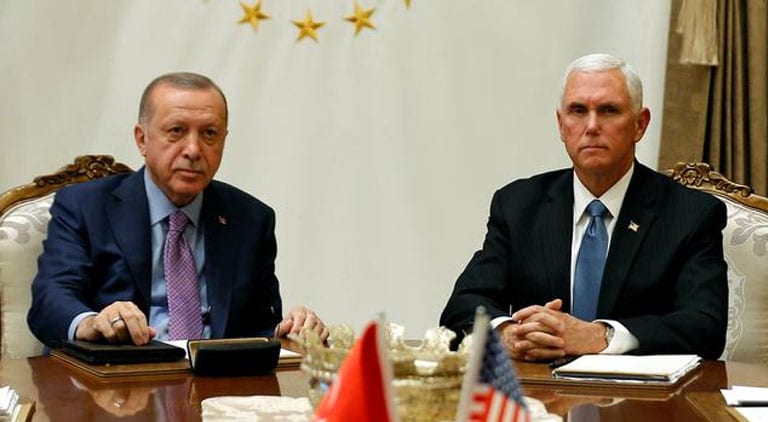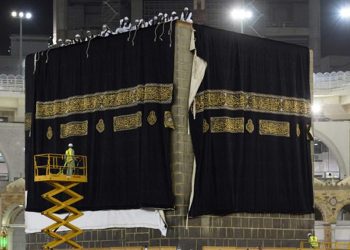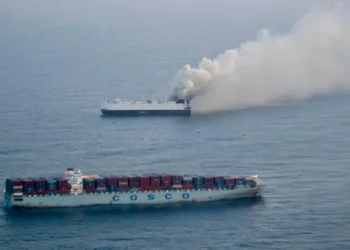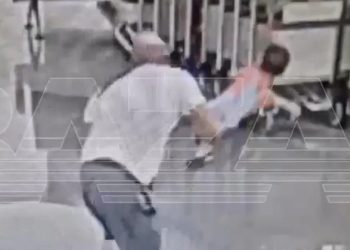ANAKARA: Turkey has agreed to a five-day ceasefire in northeast Syria to allow for withdrawal of Kurdish forces, U.S. Vice President Mike Pence said on Thursday after talks with Turkish President Tayyip Erdogan.
“Today the United States and Turkey have agreed to a ceasefire in Syria,” Pence told a news conference after more than four hours of talks at the presidential palace in Ankara.
Pence had flown to Turkey to call for a halt in Turkey’s cross-border military operation, called Operation Peace Spring, under which Turkey has aimed to clear YPG Syrian Kurdish fighters from a 20 mile (32 km) deep “safe zone” along the border.
“The Turkish side will pause Operation Peace Spring in order to allow for the withdrawal of YPG forces from the safe zone for 120 hours,” Pence said.
“All military operations under Operation Peace Spring will be paused, and Operation Peace Spring will be halted entirely on completion of the withdrawal,” he said.
The Turkish assault has created a new humanitarian crisis in Syria with 200,000 civilians taking flight, a security alert over thousands of Islamic State fighters abandoned in Kurdish jails, and a political maelstrom at home for President Donald Trump.
Trump has been accused of abandoning Kurdish-led fighters, the main partners in the battle to dismantle Islamic State’s self-declared caliphate in Syria, by withdrawing troops from the border as Ankara launched its offensive on October 9.
Trump defended his move on Wednesday as “strategically brilliant”. He said he thought Pence and Turkish President Tayyip Erdogan would have a successful meeting, but warned of sanctions and tariffs that “will be devastating to Turkey’s economy” otherwise.
The White House released a letter from Trump to Erdogan from Oct. 9 that said: “Don’t be a tough guy” and “Don’t be a fool!” Turkey had rejected Trump’s appeal to reach a deal to avoid conflict and the letter was “thrown in the trash”.
On Monday, White House economic adviser Larry Kudlow said that the United States was prepared to levy additional sanctions on if necessary “to keep Turkey in line”. A top aide to Erdogan, Ibrahim Kalin, said Turkey’s foreign ministry was preparing to retaliate for the sanctions by its NATO ally.
Erdogan has dismissed the sanctions and rejected a global chorus of calls to halt the offensive, which Turkey says will create a “safe zone” extending 20 miles into northeast Syria to ensure the return of millions of Syrian refugees and clear the area of Kurdish militia Ankara views as terrorists.
Turkey will end its operation when Kurdish forces withdraw from the “safe zone” and “no power” can deter the operation until it reaches its goals, the Turkish leader said.
Turkey’s operation has allowed Syrian President Bashar al-Assad to send his Russian-backed forces to an area that had been beyond his control for years in the more than eight-year-old Syrian war.
It also prompted the Syrian Democratic Forces (SDF), of which the Kurdish YPG is the main component, to strike a deal with Damascus for its help in countering Turkish forces.
Russia has promised Turkey that the Syrian Kurdish YPG militia targeted by the offensive will not be in the Syrian territories across the border, Turkish Foreign Minister Mevlut Cavusoglu said on Thursday.
Earlier in the day, Russia’s foreign ministry spokeswoman said Syria should get control over its border with Turkey as part of any settlement of the conflict in the region.
Assad vowed that Syria would respond to the Turkish offensive on any part of its territory with “all legitimate means” available, Syrian state media said on Thursday.
The Turkish offensive has led to the deaths of 72 civilians, 224 SDF fighters and 183 Turkish-backed rebels after the first eight days of fighting, the Syrian Observatory reported. The Kurdish-led administration in the region put the civilian death toll at 218, including 18 children, with more than 650 wounded.
Turkey’s Defence Ministry said Turkish forces and their Syrian rebel allies had “neutralised” 702 fighters, using a term which usually refers to those killed but can also refer to combatants that are captured or wounded.
In Geneva, humanitarian agencies said they were struggling to meet the needs of up to 200,000 civilians who had fled the fighting and reported water shortages in the Syrian city of Hasaka.
The operation has also created a land-rush between Turkey and Russia to partition Kurdish areas that were formerly under U.S protection. Russia, Assad’s most powerful ally, has called the offensive “unacceptable” and said it must be limited in time and scale. – Agencies



































